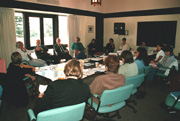![[Currents header graphic]](http://www.ucsc.edu/homeart/currents_header.gif)
![[Currents header graphic]](http://www.ucsc.edu/homeart/currents_header.gif)
September 28, 1998

|
|
Local teachers met with members of the Yale-New Haven Teachers Institute
|
UCSC's growing reputation as a leader in the area of university-school partnerships has helped position the campus as a member of a small group of universities nationwide that are hoping to replicate a successful school partnership program begun by Yale University.
The Yale-New Haven Teachers Institute is a program begun 20 years ago by Yale to foster collaboration with the New Haven Public Schools. The goal of the program has been to strengthen learning and teaching in local schools.
Each year, Yale hosts a seminar that brings local K-12 schoolteachers to campus with faculty members, and the teams work together to prepare curriculum units that respond to the expressed needs and interests of the participating teachers. The seminars, which are limited to 12 teachers, are planned jointly by teachers and faculty, and the groups incorporate the content provided by faculty into units for the grade levels of each teacher.
During recent years, curriculum units have been developed around subjects as diverse as American Political Thought; Genetics in the 21st Century: Destiny, Chance, or Choice?; Art and Artifacts: The Cultural Meaning of Objects; The Atmosphere and the Ocean; and Twentieth-Century Multicultural Theater.
The success of the program prompted its directors to look at expanding it.
"We decided to plan a national project to work with a small number of institutions that want to develop institutes like the Yale-New Haven Teachers Institute," said director Jim Vivian, who visited UCSC in September in anticipation of receiving a proposal from the campus. "All five sites we've visited, including Santa Cruz, have tremendous potential to develop an institute."
In addition to fostering curriculum development, the Yale-New Haven seminars provide a unique professional-development opportunity for teachers who enjoy the exchange of ideas with faculty-level experts, and professors gain exposure to effective teaching strategies by interacting with teachers.
To learn more about the institute, a six-member team from Santa Cruz attended an intensive session of the institute over the summer. The team is now preparing a grant proposal in hopes of launching a similar program locally.
Although UCSC has a wide service area and the number of K-12 schools is much greater than in New Haven, where the K-12 school population numbers about 20,000 and the teacher population totals about 900, Vivian said the Yale-New Haven directors are eager to see their program adapted to new areas that enroll a significant proportion of students from low-income communities.
"We want to test it in different settings and show that it can be adapted to different circumstances, communities, and institutions," he noted, adding that UC has shown renewed interest in K-12 outreach in the wake of the demise of affirmative action. UC Irvine is also among the schools competing for funding, he said.
The Santa Cruz team is led by codirectors Carrol Moran, coordinator of the Monterey Bay Educational Consortium and director of UCSC's new Educational Partnerships Center, and James Willis, acting assistant dean of the Division of Natural Sciences. Willis attended the summer institute with UCSC writing instructor Virginia Draper and associate dean of humanities Kathleen Kish. Other team members included K-12 teachers Diane Hickok and Greg McBride of Aptos High School and Elena Bubenchick of Merced High School.
The National Demonstration Project of the Yale-New Haven Teachers Institute is funded by the DeWitt Wallace-Reader's Digest Foundation.